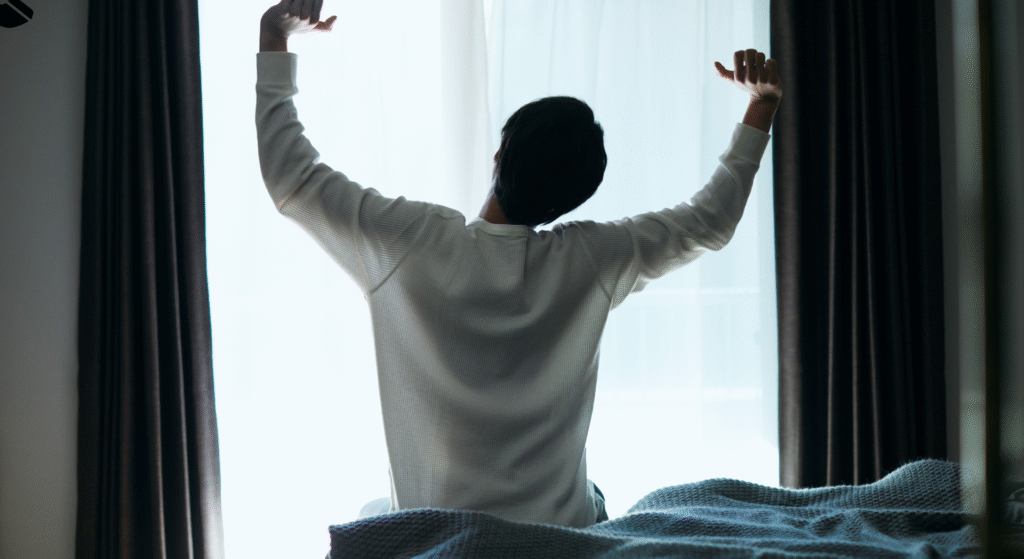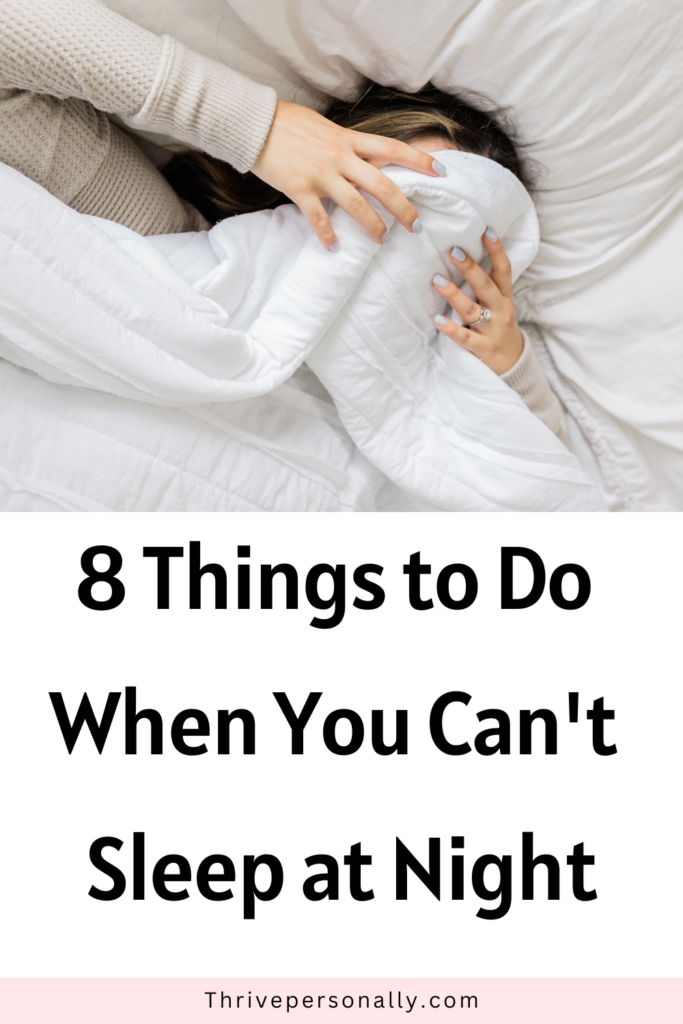I know how annoying it can be to lay in bed trying to stare at the ceiling and willing yourself to fall asleep. Sometimes no matter how exhausted you feel, you just can’t fall asleep. Well, that, my friend, is called insomnia.
Typically when I struggle with insomnia I will lay in bed for hours tossing and turning, but other times I wake up way too early and can’t fall back asleep. Either way, I wake up feeling groggy and unrested.
Insomnia can impact more than just your sleep schedule. When you’re tired, your mood, productivity, and daily life can really suffer. I found myself becoming so short-tempered and unproductive when I knew my mind just wasn’t right because I hadn’t slept well.
Sleep can be difficult to achieve for many reasons. Stress definitely plays a big role for me. If I’m going to bed thinking about work, money, or anything else that stressed me out that day, I will have a hard time falling asleep. Anxiety and even low moods can also affect your ability to sleep. It becomes this vicious cycle because when you don’t sleep you’re often more anxious.
Sleep can also be difficult when you have unhealthy bedtime habits. Things like looking at your phone in bed, going to sleep at random times, and not having a comfortable bedroom can also contribute to your insomnia. All these things were things I didn’t realize were affecting my ability to sleep!
8 Best Things to Do When You Can’t Sleep at Night
1. Do The Following Bedtime Routine
Like I mentioned earlier, my body likes to follow a pattern. When I go from staring at my phone screen to shutting off the lights, I don’t give my brain time to wind down. But when I created a bedtime routine for myself, I started telling my brain it was time to sleep!
The first thing I like to do is read a book. Nothing too in-depth that will make me have to concentrate too much. I like to read for about 30 minutes and just kind of lose myself in what I’m reading. Focusing on the words on the page helps clear my mind of the stress from the day. I even notice myself subconsciously slowing down my breathing. Taking a warm shower also helps me fall asleep! I love when I hop out of the shower, wrap my hair up in a towel, and just let my body temperature cool.
I will play with lighting some lavender essential oil in the shower sometimes or even use a sleep oriented lotion when I’m done. Lighting a few candles and playing some soft music are also things I like to do to help create a relaxing environment for myself.
Read also: Building a Productive Morning Routine
2. Dim the Screens
Believe it or not, our screen time can play a huge factor in our ability to fall asleep. Staring at your phone or ipad right before you lay down to sleep isn’t doing you any favors, my friend. I used to think scrolling through social media was the best way for me to relax before bed. Then I started tracking my sleep and noticed the nights I used my phone the most were the nights I struggled the most to fall asleep.
Our brains aren’t designed to stare at screens all day (yes we all know we do it way too much). But before we go to sleep at night we should really be resting our brains from all that blue light. At least an hour before bed I try to put my phone away and do something else. Instead of reaching for my phone first thing I noticed I started to wind down faster because I gave my brain something else to do like read a book or stretch.
Read also: 25 things to do instead of pressing your phone
3. Practice Deep Breathing
Deep breathing exercises are a wonderful way to help yourself relax when you can’t sleep. Not only does it help with stress, but it really helps slow down a racing mind.
In through your nose for 4 seconds, hold for 7 seconds, out through your mouth for 8 seconds. It sounds weird and you probably won’t get it right the first few times. But by the third or fourth time you should start to really feel your shoulders relax and your mind clear.
You can also try simply placing your hand on your stomach and taking deep breaths in and out. Focus on filling your lungs with as much air as you can and watching your stomach rise and fall with your breath.
Read also: 9 Ways to Invest in Yourself for a Better Life in 2026
4. Make Your Bedroom Sleep-Friendly

Create the right atmosphere for sleep
Start with your mattress. If you have an uncomfortable mattress, you are going to toss and turn all night trying to find a comfortable position. Try investing in a new mattress that will support the way you sleep. Whether you sleep on your side, stomach, or back you want a mattress that will contour to your body.
Next, up is pillows. Having the right pillow to support your head and neck is very important as well. Look into pillows that will support where you need it. Memory foam pillows are a personal favorite of mine because they mold to the shape of your head and neck.
5. Write in a Journal
When you’re struggling to sleep at night one of the best things you can do is write in a journal. Journaling can allow you to vent any frustrations you’ve had during the day and clear your mind!
Throughout the day we experience things that sometimes build up in our mind. Whether it be small frustrations or big life events your mind loves to create chaos when you just want to relax. By taking 15 minutes to sit down with a journal you allow your mind to think about what you’re writing down versus racing a mile a minute.
6. Try Meditation and Mindfulness
Sometimes when we can’t sleep it’s because our minds just won’t slow down. Practicing mindfulness and meditation are great ways to clear your mind at night. When trying to mindfully prepare your body for sleep you focus on your present state.
To practice mindfulness start by sitting or laying down in a comfortable position. Close your eyes and take deep breaths in through your nose and out through your mouth. Focus on the air filling your lungs and the slow release of your breath. If thoughts start to enter your mind acknowledge them and then continue to focus on your breath. This method has really helped me slow the amount of thoughts that enter my mind at night.
Meditation can help as well! Sometimes you just need some calming noises to help you relax. I love turning on some meditation guides before bed and listening to someone who’s job is telling you to sleep. There are tons of free apps you can download that offer meditation guides.
7. Stretch

If you find yourself struggling to fall asleep doing some light stretches can really help your body relax. When you stretch not only are you loosening out your muscles you are forcing yourself to focus on your body and breath.
Try starting with some neck rolls, slowly bring your head towards your shoulder and hold. Roll your shoulders forwards and backwards a few times. These stretches don’t have to be intense. You just want to move enough where you start to feel your body calm.
Another stretch you can do is stand up and reach your arms above your head and take a deep breath in. As you exhale roll your shoulders back and bend forward, letting your stomach relax towards the ground. Simple stretches like this can help relax your body and clear your mind.
8. Know When to Ask for Help
If you find yourself struggling to fall asleep 3 or more nights a week for 3 months, then you may want to look into finding help. Chronic insomnia can affect your daily life, so it’s important to know when your body is telling you something may be wrong.
If you literally cannot fall asleep at night, it may be time to talk to your doctor. For me, I realized that my insomnia was more than just not being able to sleep at night. I was tired all the time, irritable for no reason, and my performance at work was suffering.
Your doctor can help diagnose if you’re dealing with insomnia or if something else is underlying your ability to fall asleep. They can do sleep studies or have you keep a sleep log to help you figure out your sleep pattern. There’s nothing major to this, they simply want to understand what’s going on when you try to sleep!
There’s no exact way to treat insomnia. Some people need therapy such as CBT-I, some need to change up their habits. And yes, some people need medication to help improve their ability to fall asleep. What I learned when going through this process was that there was no magic cure. But talking to someone was the first step to reversing my sleep schedule.
Save the pin for later



